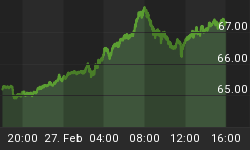The world is currently in the eye of an economic hurricane. The leading edge of the storm, which made landfall in the second quarter of 2008, raged until the first quarter of 2009, and nearly demolished the world's financial system. By sand-bagging with trillions of freshly-printed paper currencies, fudging accounting rules, subsidizing key financial houses and markets, and calming the masses with half-baked rhetoric, a worldwide collapse was averted.
But the calm is deceptive.
Because of the lull, Western governments have allowed our structural deficits to fester. Now, their spokesmen are predicting sunny skies for the foreseeable future. The Federal Reserve Chairman speaks of "exit strategies" and President Obama asserts that his stimulus package has prevented a second Great Depression. This inability to see past the horizon means our politicians have squandered our final chance to build sturdier shelters in advance of the hurricane's trailing edge.
Last week, the International Monetary Fund (IMF) announced that it would dump a further 200 metric tons of gold onto the market. With temporary strength in the U.S. dollar and economic recession still threatening in America and Europe, such news should have caused gold to break below key support levels of $1072 and $995. But the price of gold fell only slightly before resuming its upward trend. Why was the gold so resilient given the arrival of all this new supply?
As we have mentioned in previous commentaries, gold is not, as is widely believed, merely a hedge against inflation. Gold is also an insurance against catastrophe. Clearly, based on global fiscal and monetary profligacy, we all have rising consumer prices in our future. But before that gets out of hand, the Western world will be hit by the second half of the storm that struck in '08. Although the Associated Press has officially designated our current environment as "the Great Recession" by the end of 2010 our economy may be more accurately described as a depression. If so, gold would be expected to plummet in value (along with other asset prices). But this assumes that the economy will behave as if it were supported by a sound currency. That assumption no longer applies, so we must adjust our expectations accordingly.
On this frightening occasion, we are at sea in a currency of paper backed only by the hot air of political bluster and dishonest accounting. Today, for the first time in modern history, it is not just individuals and private companies that face destitution, it is entire nation-states. Furthermore, it is not only minor players like Greece and Italy, but major pillars of the global market like the United Kingdom and the United States.
The re-introduction of the Health Bill in the U.S. Congress, albeit amended, illustrates vividly that Washington's entitlement regime shows no sign of corrective discipline whatsoever. If, following the papering over of the Greek problem, international investors resume their selling of U.S. dollars and the underlying Treasury securities, the U.S. dollar may lose its reserve status - and the United States will, for the first time in living memory, face the possibility of default.
It may take years for this to happen. In all probability if downgrades are forthcoming, the United Kingdom will be the 'canary in the coal mine' and will be marked down in advance of its larger, and more indebted, progeny across the Atlantic. It is likely that such shocks will initially trigger U.S. dollar strength before the panic selling sets in. But what are cautious investors to buy when the world's reserve currency is no longer safe, and its chief competitors, the euro and yuan, are not stable or transparent? The answer is precious metals. Conservative investors are making this move early, beginning a secular bull market in this asset class.
On the sovereign scale, those countries, possibly including China, India and Switzerland, that are positioned to pull their wealth to the sturdy shelter of gold stand to survive the hurricane, battered but viable. Those countries, like the UK, which have squandered much of their real wealth and productive capacity, will likely subject their citizens to an era of unnecessary privation.
For a more in-depth analysis of our financial problems and the inherent dangers they pose for the U.S. economy and U.S. dollar, read Peter Schiff's 2008 bestseller "The Little Book of Bull Moves in Bear Markets" and his newest release "Crash Proof 2.0: How to Profit from the Economic Collapse." Click here to learn more.
More importantly, don't let the great deals pass you by. Get an inside view of Peter's playbook with his new Special Report, "Peter Schiff's Five Favorite Investment Choices for the Next Five Years." Click here to download the report for free. You can find more free services for global investors, and learn about the Euro Pacific advantage, at www.europac.net.















